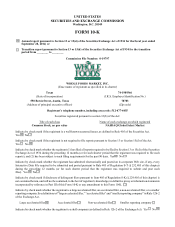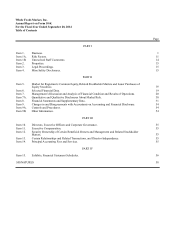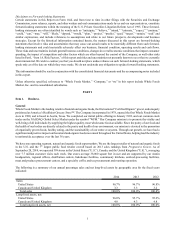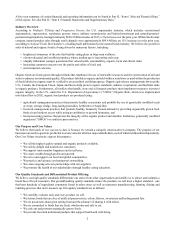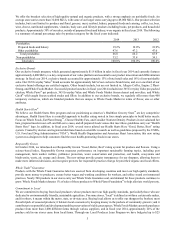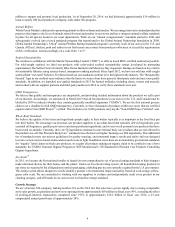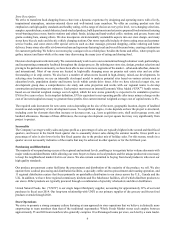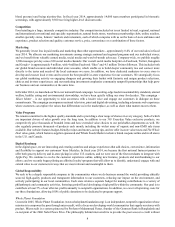Whole Foods 2014 Annual Report Download - page 11
Download and view the complete annual report
Please find page 11 of the 2014 Whole Foods annual report below. You can navigate through the pages in the report by either clicking on the pages listed below, or by using the keyword search tool below to find specific information within the annual report.8
blood pressure) and being nicotine-free. In fiscal year 2014, approximately 14,000 team members participated in biometric
screenings, with approximately 9,300 receiving higher-level discount cards.
Competition
Food retailing is a large, intensely competitive industry. Our competition includes but is not limited to local, regional, national
and international conventional and specialty supermarkets, natural foods stores, warehouse membership clubs, online retailers,
smaller specialty stores, farmers’ markets and restaurants, each of which competes with us on the basis of store ambiance and
experience, product selection and quality, customer service, price, convenience or a combination of these factors.
Marketing
We generally invest less in paid media and marketing than other supermarkets – approximately 0.4% of our total sales in fiscal
year 2014. We allocate our marketing investments among strategic national and regional programs and our individual stores;
and we benefit from valuable earned media, social media and word-of-mouth advocacy. Company-wide, we publish roughly
1,200 messages per day across 830 social media channels. Our overall social media footprint on Facebook, Twitter, Instagram
and Google+ is approximately 9 million, with 4 million Facebook “likes” and 4.5 million Twitter followers. This includes both
our global brand accounts and individual store accounts, which enable us to build deeper community ties and connect more
directly to the tastes and needs of the local customers we serve. In addition, we have dedicated marketers in every store to
develop and execute local events and to create the best possible in-store experience for our customers. We strategically focus
our global marketing activity on engaging shoppers and growing their basket with fantastic and unique product selections,
choices and in-store experiences; and our marketing investments emphasize community nonprofit partnerships that help grow
our business and our communities at the same time.
In October 2014, we launched our first-ever national brand campaign. As a cutting-edge leader in sustainability standards, animal
welfare, healthy eating and environmental stewardship, we have been quietly telling our story for decades. This campaign –
Values Matter – is our opportunity to raise awareness with a louder voice and engage our customers in dialogue on these
commitments. The campaign encompasses national television, print and digital advertising, including a dynamic web experience
where customers can explore the values that differentiate us in the marketplace, as well as share what matters most to them.
Value Programs
We remain committed to the highest quality standards and to providing a clear range of choices in every category, both of which
are important drivers of sales growth over the long term. In addition to our 365 Everyday Value exclusive products, we
competitively price thousands of branded items and have extended value choices to our perishables departments as well. We
also regularly promote thousands of products each month, including the widest array of organic and non-GMO sale items
available. Our website features budget-friendly recipes and money-saving tips, and we offer in-store value tours and The Whole
Deal value guide, which features supplier-sponsored and Whole Foods Market exclusive brand coupons online and in all stores
in the U.S. and Canada.
Digital Roadmap
In the digital space, we are innovating and creating seamless and unique experiences that add choices, convenience, information
and flexibility to support our customers’ busy lifestyles. In fiscal year 2014, we became the first national Instacart partner to
offer both grocery delivery and in-store pickup in select U.S. markets, and we were one of the first merchants to integrate with
Apple Pay. We continue to evolve the customer experience online, adding new features, products and merchandising to our
eStore; and we recently began piloting an affinity (loyalty) program that will allow us to identify, understand, engage with and
extend value to our customers in ways that are most relevant and meaningful to them.
Global Responsibility
We seek to be a deeply responsible company in the communities where we do business around the world, providing ethically
sourced, high-quality products and transparent information to our customers, reducing our impact on the environment, and
actively participating in our local communities. Each store retains a separate budget for making contributions to a variety of
philanthropic and community activities, fostering goodwill and developing a high profile within the community. Our goal is to
contribute at least 5% of our after-tax profits annually to nonprofit organizations. In addition, we cover all operating costs for
our three foundations, allowing 100% of public donations to be dedicated to program support.
Whole Planet Foundation
Created in 2005, Whole Planet Foundation (www.wholeplanetfoundation.org) is an independent, nonprofit organization whose
mission is to empower the poor through microcredit, with a focus on developing-world communities that supply our stores with
product. Microcredit is a system pioneered by Professor Muhammad Yunus, founder of the Grameen Bank in Bangladesh and
co-recipient of the 2006 Nobel Peace Prize. The philosophy behind microcredit is to provide the poor access to credit without

